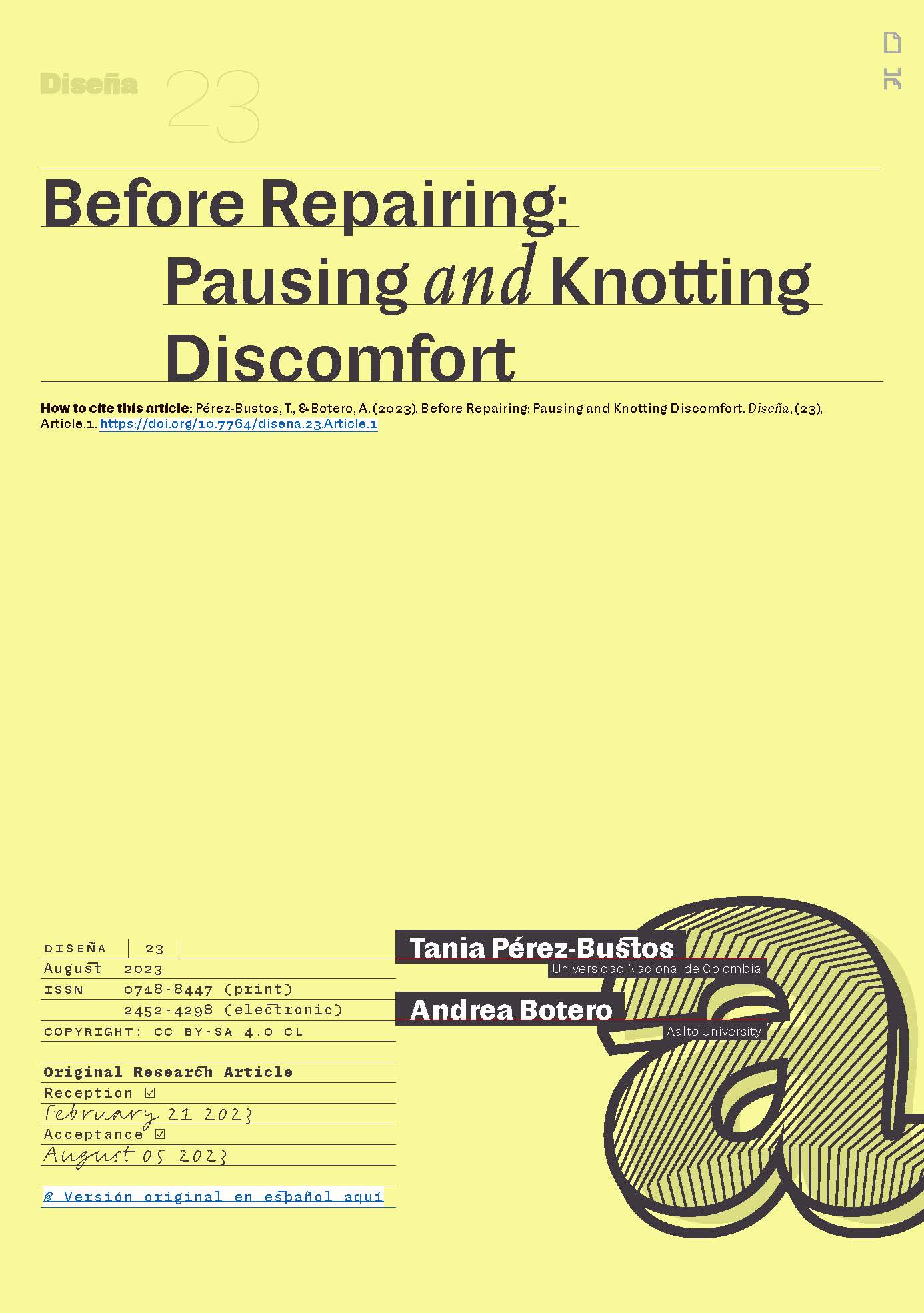Before Repairing: Pausing and Knotting Discomfort
Main Article Content
Abstract
In this work, we reflect on a speculative pedagogical exercise in which we recorded, and invited others to record, through and with knots, situations of our daily lives related to forms of containment and entrapment. Accompanying this creative and collaborative work allowed us to materialize situations of vulnerability and unease (as knots), as well as the difficulty of registering these discomforts (through knots). We are interested in presenting this exercise as an embodied design practice. We also want to highlight how the staging of vulnerability and unease―made through material practices― generates contemplative pauses that have the power to make the fragility of life visible, and thus anticipate the need for repair. We argue here that repair, as a practice linked to design, is a making that deserves to be propitiated by contemplation and catharsis, in the face of damage and fragility in capitalist contexts.
Downloads
Article Details

This work is licensed under a Creative Commons Attribution-ShareAlike 4.0 International License.

This work is licensed under a Creative Commons Attribution-ShareAlike 4.0 International license.
COPYRIGHT NOTICE
All contents of this electronic edition are distributed under the Creative Commons license of "Attribution-ShareAlike 4.0 Internacional" (CC-BY-SA). Any total or partial reproduction of the material must mention its origin.
The rights of the published images belong to their authors, who grant to Diseña the license for its use. The management of the permits and the authorization of the publication of the images (or of any material) that contains copyright and its consequent rights of reproduction in this publication is the sole responsibility of the authors of the articles.
References
Ahmed, S. (2021, May 31). La queja como pedagogía feminista. Seminario Permanente Ordinaria [video]. https://www.youtube.com/watch?v=HuAwheclHBE
Arnold, D. Y., & Espejo, E. (2012). Andean Weaving Instruments for Textile Planning: The Waraña Coloured Thread-wrapped Rods and their Pendant Cords. Indiana, 29, 173-200.
Callén Moreu, B., & López Gómez, D. (2019). Intimate with your Junk! A Waste Management Experiment for a Material World. The Sociological Review, 67(2), 318- 339. https://doi.org/10.1177/0038026119830318
Fannin, M., & Perrier, M. (2019). ‘Birth Work’ Accompaniment and PhD Supervision: An Alternative Feminist Pedagogy for the Neoliberal University. Gender and Education, 31(1), 136-152. https://doi.org/10.1080/09540253.2017.1358806
Giddens, A. (1991). Modernity and Self-Identity: Self and Society in the Late Modern Age. John Wiley & Sons.Diseña23 aug 2023 article.1 14
Graham, S., & T hrift, N. (2007). Out of Order: Understanding Repair and Maintenance. Theory, Culture & Society, 24(3), 1-25. https://doi.org/10.1177/0263276407075954
Ingold, T. (2007). Lines: A Brief History (1st ed.). Routledge.
Ingold, T. (2013). Making: Anthropology, Archaeology, Art and Architecture (1st ed.). Routledge.
Jungnickel, K. (2022). Speculative Sewing: Researching, Reconstructing, and Re-imagining Wearable Technoscience. Social Studies of Science, Advance online publication. https://doi.org/10.1177/03063127221119213
Lindström, K., & S tåhl, Å. (2016). Patchworking Ways of Knowing and Making. In J. Jefferies, D. W. Conroy, & H. Clark (Eds.), The Handbook of Textile Culture (pp. 63-78). Bloomsbury.
Maffía, D. H. (2005). Conocimiento y emoción. Arbor, 181(716), Article 716. https://doi. org/10.3989/arbor.2005.i716.408
Medrano, M. (2021). Quipus: mil años de historia anudada en los Andes y su futuro digital. Planeta Perú.
Pérez-Bustos, T. (2019). Mi tiempo ya no es mío: Reflexiones encarnadas sobre la cienciometría. Nómadas, 50, 35-43. https://doi.org/10.30578/nomadas.n50a2
Puigde la Bellacasa, M. (2012). ‘Nothing Comes Without Its World’: Thinking with Care. The Sociological Review, 60(2), 197-216. https://doi.org/10.1111/j.1467- 954X.2012.02070.x
Spelman, E. V. (2002). Repair: The Impulse to Restore in a Fragile World. Beacon Press.
Stengers, I., & Pignarre, P. (2021). Brujería capitalista. Prácticas de desembrujo. IF.
Suchman, L. (2002). Located Accountabilities in Technology Production. Scandinavian Journal of Information Systems, 14(2), 91-105.
Urton, G. (1998). From Knots to Narratives: Reconstructing the Art of Historical Record Keeping in the Andes from Spanish Transcriptions of Inka Khipus. Ethnohistory, 45(3), 409-438. https://doi.org/10.2307/483319

